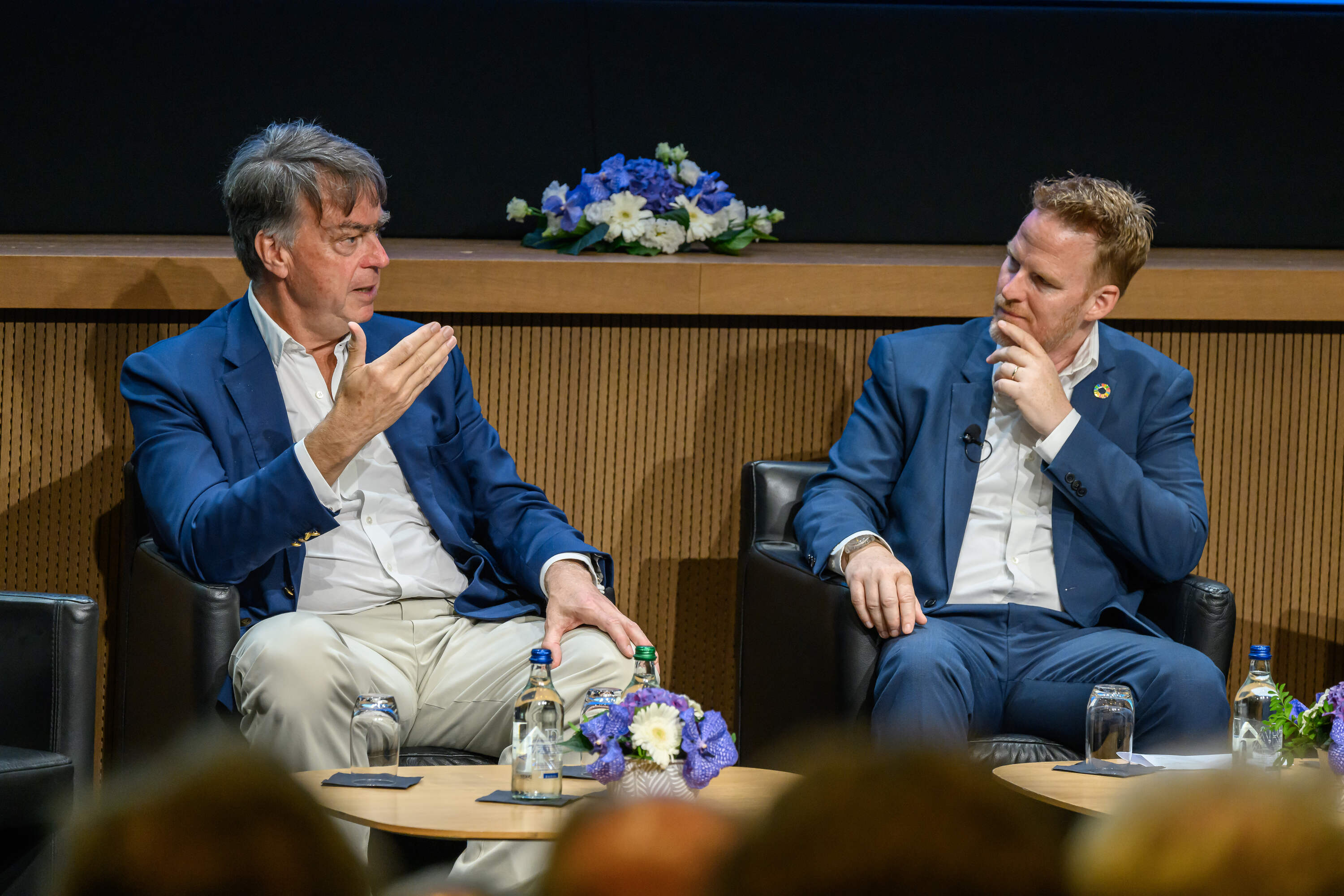How to identify greenwashing
It's become clear that sustainability can be used as a powerful marketing tool, but how many companies are actually doing what they say? Here are some tools to determine whether an organizing...
September 2, 2024 • by Julia Binder in Sustainability
Capitalism must be amended to include the interests of nature and society....
Industrial capitalism has undeniably lifted millions out of poverty and extended our healthy lifespans, but it’s increasingly clear that its current approach is failing both nature and society. Prosperity is poorly managed and often destructive.
During the global launch of The New Nature of Business by André Hoffmann and Peter Vanham, I moderated a panel exploring how to reinvent business models to create sustainable prosperity. Hoffmann and Vanham argue that businesses must consider their effects on “the three Cs” – social, natural, and human capital – and understand how these interact.
“We don’t need to throw away the capitalistic system, we need to amend it,” said Hoffmann in an opening conversation with new IMD President David Bach. Specifically, we need to move away from the prevailing model of short-term profit maximization, championed by Milton Friedman in the 1960s, where society was left to deal with the negative externalities of value creation. “These externalities are getting too large to ignore because they are making it harder for businesses to create value.”
Hoffmann highlighted Roche, his family’s business where he serves as Vice Chairman, as an example. The Swiss drugmaker spent over 100 million Swiss francs to clean up the Rhine river in Basel, once known as Europe’s sewer. While it was costly and a hit to short-term profits, this move has paid off, as other firms now face even greater pressure and higher costs to follow suit.
To shift away from a focus on short-term profits, businesses need to quantify social and environmental impacts on their balance sheets, he said. “Accountants are going to save the planet,” Hoffmann said. “If we can put nature onto the balance sheet then suddenly you realize that it’s not for free, but it does have a cost. We need to be able to talk about nature in the way that we talk about time and talent and financing. Nature matters.”
The technology is not holding us back. Nature is not holding us back. We’re holding ourselves back. Which is why the conversation triggered by this book is so important.- David Bach, President of IMD
The book includes examples of companies that have reinvented their business model as a force for good, including those in traditionally hard-to-abate sectors like cement. Swiss buildings materials giant, Holcim, for example, has embarked on a transformation to become carbon neutral and nature positive.
“Doing good is actually good business,” said Chief Sustainability Officer Nollaig Forrest, citing her main takeaway from the book “If you apply that to how you run any company, figuring out where your externalities are, and figuring out how, through your own business model, you can tackle them, you can make exponential impact.”
Forrest described how Holcim’s transformation was triggered by a point of crisis about its future, and driven by visionary leadership and the bold decision to set a roadmap towards net zero. Recognizing that its greatest impact lay in how it generates revenue rather than how it spends it, Holcim innovated by introducing ECOpact, a low-carbon concrete range that now represents 28% of its ready-mix sales, surpassing its 2025 target of 25%. The company also launched ECOcycle, a circular technology platform that recycles construction demolition materials into new buildings.
Lastly, by collaborating with external stakeholders, including local building authorities, Holcim successfully influenced building norms.

It’s not just multinationals that have the power to drive change. Smaller organizations, such as startups, also have a role to play in dismantling the status quo and changing the system step by step.
Frederic James Gentizon, CEO of Innergia, a local, renewable-energy cooperative, challenged the notion that the average individual cares about climate change. Instead, his company has put a different lens on the issue by focusing on the threat of power shortages to help empower local communities to become independent by producing their own sources of renewable energy. “The idea is to put people back in balance with their local resources,” he explained.
Hoffmann agreed that collaboration across stakeholders will be necessary. “Planetary limits and social systems are absolutely linked. We won’t bring about a long-term change about how we consume resources if we don’t address social issues,” he said.
All panelists agreed that regulation will be crucial in driving systems change so that businesses start to internalize social and environmental costs into the price rather than being rewarded for producing at the lowest cost regardless of the impact on nature and society.
Effective regulation should foster a partnership between the private sector and regulators to create value, rather than merely imposing restrictions or encouraging businesses to bypass rules, said Hoffmann.
“In order to change the system,we need an economic system based on added value,” added Gentizon.
For those who may still be questioning whether sustainable business models can truly be profitable, Holcim’s Forrest had a heartening message. Its circular technology platform, which involves turning demolition waste into building materials, has become one of its most profitable business lines, highlighting how moving away from a “take-make-waste” business model can give you a sustainable edge.
“If you can make that happen at scale, you can unlock a lot of value,” she emphasized.
Summarizing the discussion, IMD President David Bach said an overriding theme had been the centrality of people in the new nature of business, from visionary leaders to initiatives at the local level.
“In some ways that may seem like bad news, because it’s hard for people to change. But I think it is good news because people can change the system. It’s as simple as that,” he said. “The technology is not holding us back. Nature is not holding us back. We’re holding ourselves back. Which is why the conversation triggered by this book is so important.”

Professor of Business Transformation at IMD
Julia Katharina Binder, Professor of Business Transformation, is a renowned thought leader recognized on the 2022 Thinkers50 Radar list for her work at the intersection of sustainability and innovation. As Director of IMD’s Center for Sustainable and Inclusive Business, Binder is dedicated to leveraging IMD’s diverse expertise on sustainability topics to guide business leaders in discovering innovative solutions to contemporary challenges. At IMD, Binder serves as Program Director for Creating Value in the Circular Economy and teaches in key open programs including Transition to Business Leadership (TBL), and Leading Sustainable Business Transformation (LSBT). She is involved in the school’s EMBA and MBA programs, and contributes to IMD’s custom programs, crafting transformative learning journeys for clients globally.
August 18, 2022 • by Knut Haanaes, Frédéric Dalsace, James E. Henderson in Sustainability • 3 min read
It's become clear that sustainability can be used as a powerful marketing tool, but how many companies are actually doing what they say? Here are some tools to determine whether an organizing...
August 11, 2022 in Sustainability • 6 min read
As environmental disasters become more frequent, the role of sustainable human resource (HR) practices will be critical in supporting the wellbeing and safety of workers...
August 4, 2022 • by Sara Gay in Sustainability • 5 min read
The pandemic has set back efforts to increase gender equality and women’s progression in the workplace. Taking meaningful action to prioritize work/life balance and increasing efforts to remove unconscious biases around women’s...
August 2, 2022 • by Misiek Piskorski in Sustainability • 6 min read
Implicit bias training does not bring the desired results. Organizations should focus on helping employees to discuss diversity with each other and implement the outcomes of these conversations....
July 21, 2022 • by Ralf W. Seifert, Yara Kayyali Elalem in Sustainability • 6 min read
Taking a full supply chain perspective on sustainability has never been more urgent....
July 14, 2022 • by Knut Haanaes in Sustainability • 8 min read
Why Paul Polman believes that companies whose leaders bring humanity back into business will help us all achieve net zero...
June 28, 2022 • by Anand Narasimhan in Sustainability • 10 min read
The future of the plastics industry hinges on a shift to a circular business model and the recruitment of the brightest and the best young people, Lucrèce Foufopoulos says in an I...
June 27, 2022 • by Achim Hupperts, Jan van der Kaaij in Sustainability • 8 min read
Making materiality the cornerstone of your sustainability strategy will help you to prioritize ESG issues to ensure they drive a business strategy that benefits both your organization and society...
June 20, 2022 • by Kamiar Mohaddes, Knut Haanaes, Marya L. Besharov in Sustainability • 7 min read
Government incentives to promote green technology and collaboration between startups and established companies will help accelerate the transformation to net zero, experts said in the latest Business Schools for Climate Leadership webinar....
June 20, 2022 • by Jerry Davis in Sustainability • 7 min read
Environmental, social and governance measures have become a central battleground over the purpose of a corporation and who gets to exercise control....
 Audio available
Audio availableExplore first person business intelligence from top minds curated for a global executive audience